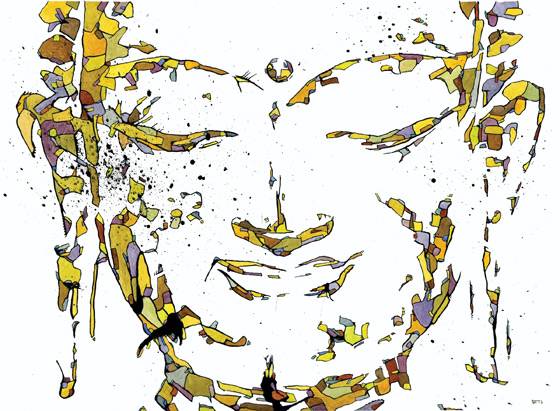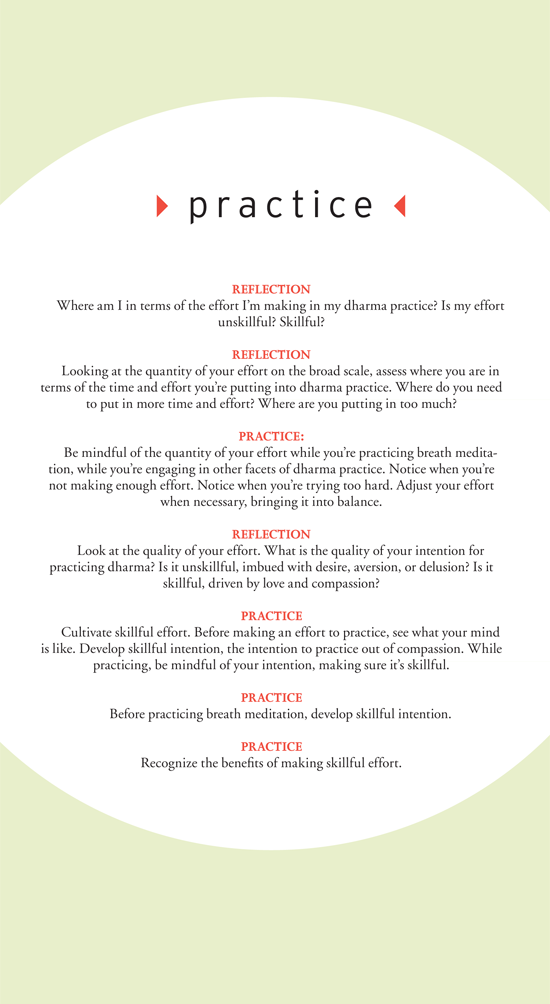Some dharma teachers may be reluctant to encourage students to make strong effort. The Buddha, however, wasn’t at all shy about urging his disciples to do so. In doing so, he often explained to his followers that he was exhorting them because he had compassion for them, because he wanted them to find an end to suffering.
It takes strong effort to follow the Buddha’s path. It isn’t a path for the lazy or halfhearted. Like any meaningful undertaking, dharma practice requires great effort. Think about anybody who has achieved a high level of proficiency in a particular area. Chances are, they’ve made exceptional effort. Very little in life is accomplished without a degree of perspiration. When we watch somebody display great expertise, it all may seem rather effortless; but the truth is, it takes a lot of practice to reach that seemingly effortless state.
As dharma students we’re asked to make strong effort. But we’re asked to make a certain kindof effort: skillful effort. During the course of our lives, most of us have probably had a rather unskillful relationship to the subject of effort. In making effort, in whatever context, we’ve probably cultivated bad habits. We’ve probably caused ourselves suffering. Most of us, of course, were never shown how to make skillful effort. On the contrary, the people who served as roles models for us—parents, teachers, bosses, and so on—probably showed us how to make unskillful effort. In all likelihood we’ve learned ways of making effort that aren’t useful in terms of finding true happiness in our lives.
So how do we make skillful effort?
As dharma practitioners we make effort in the service of abandoning the unskillful and developing the skillful. The Buddha explains:
And what, monks, is right effort? There is the case where a monk generates desire, endeavors, activates persistence, upholds and exerts his intent for the sake of the non-arising of evil, unskillful qualities that have not yet arisen . . . He upholds and exerts his intent for the sake of the abandonment of evil, unskillful qualities that have arisen. He . . . upholds and exerts his intent for the sake of the arising of skillful qualities that have not yet arisen. He generates desire, endeavors, activates persistence, upholds and exerts his intent for the maintenance, non-confusion, increase, plenitude, development, and culmination of skillful qualities that have arisen: This, monks, is called right effort. (Samyutta Nikaya 45.8; trans. Thanissaro Bhikkhu)
In developing skillful effort we pay attention to (1) the quantity of our effort and (2) the quality of our effort.
It is important to be mindful of the quantity of our effort. Effort must be balanced. To this end we’re asked, in developing skillful effort, to discern whether we’re making too little or too much effort.
In observing the quantity of our effort, we step back and take a broad view of our practice. Doing so, you may discern that you’re not making enough effort. You may recognize, for instance, that you need to make greater effort to practice breath meditation. You’ve been meditating four or five days a week, but you realize it’s not enough. In order to develop sufficient concentration you’re going to need to meditate every day.
Conversely, you may discern that you’re making too much effort. Perhaps you’re putting too much time into “closed eyes” practice. As a result, you’ve been neglecting other parts of your life like your work or your relationships. All the meditation, you see, isn’t actually supporting your efforts to end suffering.
We also observe the effort we’re making from moment to moment as we’re following the Buddha’s path. Scrutinizing your efforts while meditating, you may discern that you’re not applying sufficient effort. You’re chasing after thoughts, and you’re not making much, if any, effort to bring your attention back to the breath. Recognizing that your effort is slack, you increase it.
We increase effort largely by inclining to the skillful quality of effort. We assert the intention to make more effort. We tell ourselves: More effort. We have an innate ability to make effort. It may not be developed, but we have it. By inclining to this quality, shining the light of our awareness on it, we’re able to connect to our capacity for making effort.
Examining your effort while meditating, you may notice that you’re making too much effort. Gritting your teeth, dripping with sweat, you’re pushing like a jogger with a twisted ankle trying to run up a hill. This sort of over-efforting creates tension and dis-ease. It prevents you, in fact, from developing concentration.
In the sutta “About Sona” (Sona Sutta), the Buddha explains how to cultivate skillful effort. Sona was a monk with a propensity for making an inordinate amount of effort. It seems he was putting so much effort into walking meditation that his feet were bleeding. Clearly, the way Sona was going about things wasn’t working, and he was getting discouraged. In fact, he was considering giving up the monk’s life. When effort is unskilled, we often find dharma practice unpleasant, and, consequently, we build up an aversion to the practice. The aversion frequently leads to doubt. We doubt our ability to practice. We doubt the practice itself. Many practitioners get caught in this syndrome.
Luckily for Sona, the Buddha was clued in to his dilemma. He taught Sona to develop skillful effort:
“Now what do you think, Sona. Before, when you were a house-dweller, were you skilled at playing the vina [a lute or guitar]?”
“Yes, lord.”
“And what do you think: when the strings of your vina were too taut, was your vina in tune and playable?”
“No, lord.”
. . .
“And what do you think: when the strings of your vina were neither too taut nor too loose, but tuned to be right on pitch, was your vina in tune and playable?”
“Yes, lord.”
“In the same way, Sona, overaroused persistence leads to restlessness, overly slack persistence leads to laziness. Thus you should determine the right pitch for your persistence. . . .” (Anguttara Nikaya 6.55, trans. Thanissaro Bhikkhu)

If effort isn’t balanced, the Buddha says, we’ll produce an untoward result, in the same way that a stringed instrument, if not tuned properly, will produce a dissonant sound. In dharma practice, our effort must be “in tune.” Like a musician, the dharma student learns to discern the “pitch” of his effort. When he notices he’s making insufficient effort, he turns the effort up. When he’s making too much effort, he turns it down. Cultivating skillful effort, we learn to distinguish the “right” amount of effort. Not too little. Not too much. Just right. In tune. When we find the right pitch, our practice flourishes.
There have probably been times during your life, when you’ve been involved in certain endeavors, when you didn’t mind making a lot of effort. In all likelihood your strong exertion was in the service of doing something you wanted to do, something you enjoyed. This was my experience when I played soccer in high school and college. The sport required much effort, but I didn’t mind. On the contrary, I loved every minute of it. Putting effort into it wasn’t a problem; it was a joy.
In traversing the Buddha’s path, we have to learn to develop this same kind of heartful effort. We have to learn to practice heartfully. We have to learn to put our heart into the practice.
The heart quality that motivates dharma practice is compassion; we practice out of compassion for ourselves, so that we may end our suffering. You may not have a heartful relationship to dharma practice. But that’s okay; you can learn to put your heart into your practice.
It’s all about intention. If your intention is skillful, imbued with compassion, the quality of your effort will be skillful. And you can develop skillful intention.
As you practice the dharma, it’s important to pay close attention to the quality of your intention. As you scrutinize your practice, you may discern that the quality of your effort is unskillful. You may discern that your effort is informed by unskillful desire. Maybe you’re compelled by an excessive desire to obtain results.
Or, as you sit down to meditate, you may notice that you’re riddled with aversion. You don’t want to be doing what you’re doing. Like a kid who doesn’t want to play the piano, you’re practicing, but you’re not happy about it.
You may discern, when meditating, that your intention is marred by delusion. You’re not in touch with a clear-cut intention. As you take your seat on the cushion or chair, you’re like somebody who’s been getting on the same commuter train every day for the past twenty years. You’re just going through the motions.
As dharma students developing skillful effort, we seek to purify our intention. We recognize when our intention is unskillful, infused with desire, aversion, or delusion. Assuming the role of the observer, we step back from the unskillful mental quality. We get some distance from it. We stop feeding it. The unskillful quality, in turn, begins to lose its power.
Abandoning unskillful intention, we develop skillful intention. We develop skillful intention by (1) asserting directed thought and (2) connecting to a felt sense.
When we sit down to meditate, we see what the mind is like. Then we set a skillful intention. We assert that we’re going to practice breath meditation, and we’re going to practice out of compassion for ourselves. Then we connect to a felt sense of the heart, the feeling of compassion. It’s important to set a skillful intention at the beginning of every period of formal meditation.
After my morning meditation and before attending to the day’s affairs, I’ll set an intention to keep the breath in mind as the day goes on. Asserting directed thought, I’ll say something along these lines: “I’m going make an effort to keep the breath in mind throughout the day. I’m going to practice out of compassion for myself.” I’ll put my attention on my heart center and apprehend a felt sense of compassion. During the day I’ll check my intention, looking to see if I’m making a wholehearted effort to keep the breath in mind. If I see that I’ve lost the thread, I’ll reset my intention.
In order to move forward toward a greater happiness, we have to learn to make skillful effort. When effort is unskillful, our ability to move forward is greatly diminished. Think about Sona. Plagued by his out-of-tune effort, he came close to forsaking the dharma.
In many ways, it’s the skillfulness of our effort that determines our ability to go on.
Sona, in fact, became fully enlightened, an arahant, not long after he learned to adjust his effort. And although we might not become arahants, we’ll certainly come to know the fruits of the path if we learn to make skillful effort.
